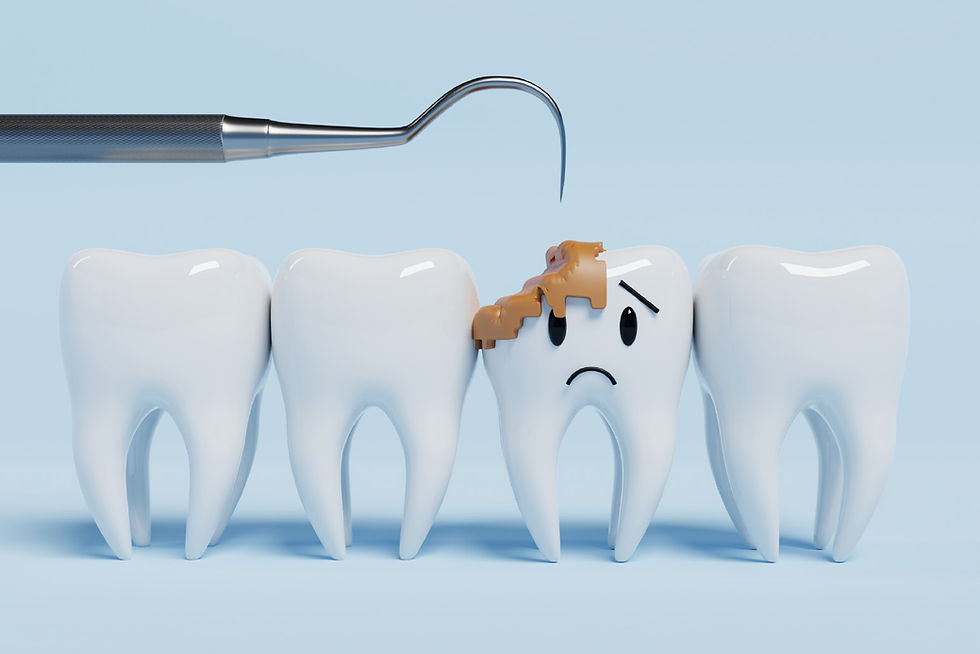How do we prevent cavities from growing?
- Aug 5, 2025
- 3 min read

If food, bacteria and acid are how cavities grow, then making changes to each of these areas can interrupt cavity formation.
Starting with food, it is important to know which foods bacteria can and cannot break down. Simple sugars and processed carbohydrates are the easiest foods for bacteria to eat. Fruit leather, gummies, dried mango, raisins, potato chips and crackers are some of the most popular foods that promote cavity growth. The problem is not isolated to their composition of sugars, as these foods stick on the teeth and are not easily washed away with chewing and saliva. Thus, the acid formation from the bacteria continues for a long time in the same place.
Raw fruit, vegetables, fat and protein work just the opposite. They have a much more complicated composition and the bacteria cannot easily metabolize and create acid. Cheese is interesting in that it can stick to teeth; however, the bacteria are unable to eat it and it does not promote cavity growth. Protein is similar to cheese. People with high protein diets generally have a lower threat of cavities as some of the components in meat, such as arginine, actually help to neutralize the acid by raising the pH level of the saliva. Fresh fruits and vegetables, peanut butter are healthy alternatives to chips and gummy snacks.
The second area of focus is on the bacteria themselves. If we could reduce the number of bacteria, keep them from staying in the same place and make them weaker, that would also slow down the formation and growth of the cavities. Reducing the number of bacteria requires the use of an antimicrobial agent. Some mouth rinses have antimicrobial ingredients.
Povidone-iodine (brand name Betadine), once used for skin disinfectant, has been found to reduce cavity-causing bacteria through rinsing or brushing (not swallowing) weekly. Note that this is not recommended for pregnant mothers, or individuals with a thyroid condition or anyone with an iodine allergy.
While reducing the number of bacteria will decrease the cavity risk, brushing in the morning and night will also aid in preventing decay. The idea behind this advantage is two-fold: brushing itself (along with flossing) dislodges the food and bacteria from the tooth. If they can’t stay in the same place, they can’t continue to make the cavity bigger. Essentially, if their bacterial colonies are broken up, then the ability to produce acid in the same spot is inhibited. With young children or individuals with a lack of dexterity, it is critical to help with “touch up brushing” to remove the sticky food from the grooved parts of the teeth and between the teeth.
While young people may have impressive streaks of independence in their nature, the quality of their tooth brushing may not have the level of precision to clean the areas properly. Think stick people drawings and self-portraits by 5-year-olds: intent and ability do not always coincide.
The final consideration is the acid produced. The normal pH range for saliva is 6.2 to 7.6. Enamel begins to dissolve at a pH of 5.5. Interestingly, the pH of common drinks are below this demineralizing threshold with cola at 2.7, apple juice from 3 to 4.5, and many sparkling waters from 3 to 4.
While one action to reduce the impact of acid is to limit the intake of high acidic foods, a second action is to increase salivary flow. Increasing spit volume will also increase the pH of saliva. One way to stimulate saliva flow is the use of sugarless chewing gum. Xylitol sugarless gum is the best choice. Xylitol has two benefits. First, it cannot be metabolized by the bacteria, thus reducing localized acid production. Second, it interferes with the production of a sticky substance that helps bacteria adhere to the tooth surface.
By making small changes to areas impacting diet, hygiene, saliva volume and pH, cavity growth can be diminished or prevented completely. For questions or additional information, please call or email us at Bluefish Dental and Orthodontics.
Brought to you by:
Dr. Cate Quas
Bend | 2565 NE Butler Market Rd Bend, OR 97701
541-317-1887
Redmond | 1429 SW 15th Street Redmond, OR 97756
541-923-1300





Comments